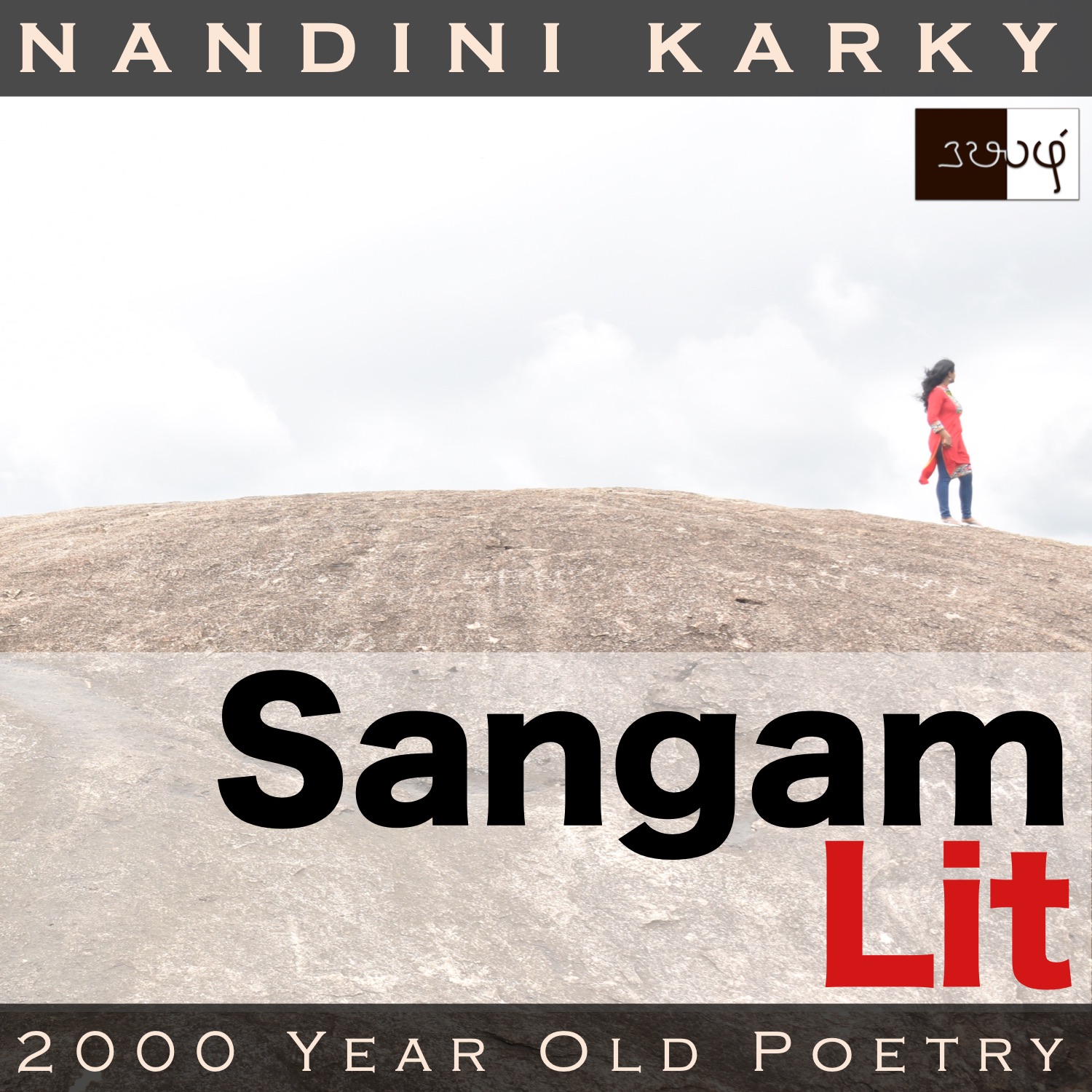Podcast: Play in new window | Download
Subscribe: Apple Podcasts | Spotify | Amazon Music | Android | iHeartRadio | Email | TuneIn | RSS | More

In this episode, we empathise with the inner life depicted in Sangam literary work, Natrinai 33, written by Ilavettanaar, set in the ‘Paalai’ landscape or the drylands, featuring the theme of separation. The verse is expressed in the words of the lady’s confidante to the man, conveying the sadness in the lady’s heart.
“படு சுடர் அடைந்த பகு வாய் நெடு வரை,
முரம்பு சேர் சிறுகுடி, பரந்த மாலை,
புலம்பு கூட்டுண்ணும் புல்லென் மன்றத்து,
கல்லுடைப் படுவில் கலுழி தந்து,
நிறை பெயல் அறியாக் குறைத்து ஊண் அல்லில்,
துவர்செய் ஆடைச் செந் தொடை மறவர்
அதர் பார்த்து அல்கும் அஞ்சுவரு நெறியிடை,
இறப்ப எண்ணுவர் அவர் எனின், மறுத்தல்
வல்லுவம்கொல்லோ, மெல்லியல்! நாம்?” என
விம்முறு கிளவியள் என் முகம் நோக்கி,
நல் அக வன முலைக் கரை சேர்பு
மல்கு புனல் பரந்த மலர் ஏர் கண்ணே.
The sun scorches on this poem as it opens with the words ‘படு சுடர் அடைந்த’ meaning ‘feeling the fierce sun.’ The dry, sweltering images continue to unfold with ‘முரம்பு சேர்’ meaning ‘a dry, hard ground’ and ‘what is’ being described by ‘what isn’t’ in the phrase ‘நிறை பெயல் அறியா’ meaning ‘knowing not abundant rains’. As we move on, the dry place takes on darker hues with the words ‘அஞ்சுவரு நெறி’ meaning ‘a path filled with fear.’ An interesting discovery I made was about the word ‘புலம்பு’. The most commonly attributed meaning to this word is ‘to lament’ or ‘to speak in a worried way.’ Here, in the poem, this same word is used in the meaning of ‘the lonely’. But, looking at it deeply, it’s the lonely who lament, don’t they? Yet again, in the alternate meanings of such ancient words, I see an acute understanding of the human psyche.
Wiping the sweat of our brows, let’s sit under the shade of the explanatory texts and see what the poem is whispering to us. The lady is saddened hearing that the man will soon part from her and leave on a journey. The lady’s confidante brings news from the lady’s heart to the man, saying, “By those tall mountains which have been cracked apart by a fierce sun, on that village rising on a hard, unforgiving ground, as evening spreads, those lonely men come together to share the spoils. A place where splitting the rocklike ground, puddles are made, only to render muddy water to quench their thirsts. A land that has never known abundant rain and thus, where food is scarce to come by. Here, wearing red clothes, those robbers whose arrow never misses, roam around, lying in wait for those unsuspecting travellers, walking on these paths filled with fear. Through such paths and to such a fear-evoking land, if my man is determined to go, will I have the strength to restrain him, my delicate friend? Saying these words to me, she sheds tears that fall on her beautiful bosom, tears that flow like a stream from her flower-like eyes.“
Let’s take a walk on the land depicted here. It’s a dry and dreary place, a land which knows not the luxury of a rainfall. Where there is no rain, there shan’t be food to stock and eat at leisure. Food is indeed scarce to come by, here. It’s a hardened ground, filled with rocks, where no crops can grow. The men with their ingenuity try to break this hardened surface and make small puddles, which yields but muddy water. They have to quench their thirsts with such water. A land which knows not fine things and a life of ease. So, how will the men who live there be? The harshness of the land is bound to seep into their souls. For they are lonely, each man, perhaps an island unto himself. And yet, why do they eat together? I imagine that in such a land, sharing is of vital importance, for refusal to share can only end in conflict and even, eventual death, at the hands of others. Such is the harsh reality! A path filled with scarcity and also, the scare of being hunted by the desperate! Such a depiction of drylands is watered in the end, by the tears of the lady, which gush and flow like an angsty stream from her luscious flower-like eyes. The lady’s confidante also seems to draw a subtle contrast between the path that the man intends to take, filled with dryness and her lady’s beautiful eyes, blooming like a bud. A hidden ploy to make the man stay, no doubt!
The way the lady addresses her confidante as ‘மெல்லியல்’ made me look up surprised. For it’s the lady who’s the ‘மெல்லியல்’ or ‘the delicate one’ for she says that she does not have the strength to stop her man who intends to go on this path. Then, why does she call her friend thus? It’s as if a gentle breeze blew and whispered in my ears the reason why. This is a classic example of an aspect of human behaviour called as ‘projection’. What we feel within, we tend to project on those around us. For instance a guilt that a person feels about something may make them see an accusation in their spouse, when the thought may not even have crossed the spouse’s mind. A subtle something that we can take from this depiction of inner life, two thousand years ago, and look with awareness at our own actions, to unravel the meaning of who we are, within!




Share your thoughts...